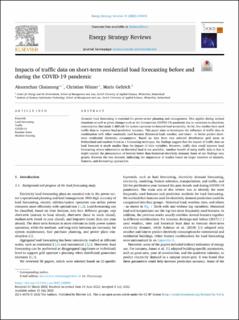Please use this identifier to cite or link to this item:
https://doi.org/10.21256/zhaw-25718| Publication type: | Article in scientific journal |
| Type of review: | Peer review (publication) |
| Title: | Impacts of traffic data on short-term residential load forecasting before and during the COVID-19 pandemic |
| Authors: | Chaianong, Aksornchan Winzer, Christian Gellrich, Mario |
| et. al: | No |
| DOI: | 10.1016/j.esr.2022.100895 10.21256/zhaw-25718 |
| Published in: | Energy Strategy Reviews |
| Volume(Issue): | 2022 |
| Issue: | 43 |
| Page(s): | 100895 |
| Issue Date: | 2022 |
| Publisher / Ed. Institution: | Elsevier |
| ISSN: | 2211-467X 2211-4688 |
| Language: | English |
| Subjects: | COVID-19; Load forecasting; Machine learning; Random forest; Traffic |
| Subject (DDC): | 333.79: Energy |
| Abstract: | Accurate load forecasting is essential for power-sector planning and management. This applies during normal situations as well as phase changes such as the Coronavirus (COVID-19) pandemic due to variations in electricity consumption that made it difficult for system operators to forecast load accurately. So far, few studies have used traffic data to improve load prediction accuracy. This paper aims to investigate the influence of traffic data in combination with other commonly used features (historical load, weather, and time) – to better predict short-term residential electricity consumption. Based on data from two selected distribution grid areas in Switzerland and random forest as a forecasting technique, the findings suggest that the impact of traffic data on load forecasts is much smaller than the impact of time variables. However, traffic data could improve load forecasting where information on historical load is not available. Another benefit of using traffic data is that it might explain the phenomenon of interest better than historical electricity demand. Some of our findings vary greatly between the two datasets, indicating the importance of studies based on larger numbers of datasets, features, and forecasting approaches. |
| URI: | https://digitalcollection.zhaw.ch/handle/11475/25718 |
| Fulltext version: | Published version |
| License (according to publishing contract): | CC BY 4.0: Attribution 4.0 International |
| Departement: | School of Management and Law |
| Organisational Unit: | Institute of Business Information Technology (IWI) Center for Energy and Environment (CEE) |
| Appears in collections: | Publikationen School of Management and Law |
Files in This Item:
| File | Description | Size | Format | |
|---|---|---|---|---|
| 2022_Chaianong-Winzer-Gellrich_Impacts-traffic-data-residential-load-forecasting-Covid-19.pdf | 2.8 MB | Adobe PDF |  View/Open |
Show full item record
Chaianong, A., Winzer, C., & Gellrich, M. (2022). Impacts of traffic data on short-term residential load forecasting before and during the COVID-19 pandemic. Energy Strategy Reviews, 2022(43), 100895. https://doi.org/10.1016/j.esr.2022.100895
Chaianong, A., Winzer, C. and Gellrich, M. (2022) ‘Impacts of traffic data on short-term residential load forecasting before and during the COVID-19 pandemic’, Energy Strategy Reviews, 2022(43), p. 100895. Available at: https://doi.org/10.1016/j.esr.2022.100895.
A. Chaianong, C. Winzer, and M. Gellrich, “Impacts of traffic data on short-term residential load forecasting before and during the COVID-19 pandemic,” Energy Strategy Reviews, vol. 2022, no. 43, p. 100895, 2022, doi: 10.1016/j.esr.2022.100895.
CHAIANONG, Aksornchan, Christian WINZER und Mario GELLRICH, 2022. Impacts of traffic data on short-term residential load forecasting before and during the COVID-19 pandemic. Energy Strategy Reviews. 2022. Bd. 2022, Nr. 43, S. 100895. DOI 10.1016/j.esr.2022.100895
Chaianong, Aksornchan, Christian Winzer, and Mario Gellrich. 2022. “Impacts of Traffic Data on Short-Term Residential Load Forecasting before and during the COVID-19 Pandemic.” Energy Strategy Reviews 2022 (43): 100895. https://doi.org/10.1016/j.esr.2022.100895.
Chaianong, Aksornchan, et al. “Impacts of Traffic Data on Short-Term Residential Load Forecasting before and during the COVID-19 Pandemic.” Energy Strategy Reviews, vol. 2022, no. 43, 2022, p. 100895, https://doi.org/10.1016/j.esr.2022.100895.
Items in DSpace are protected by copyright, with all rights reserved, unless otherwise indicated.